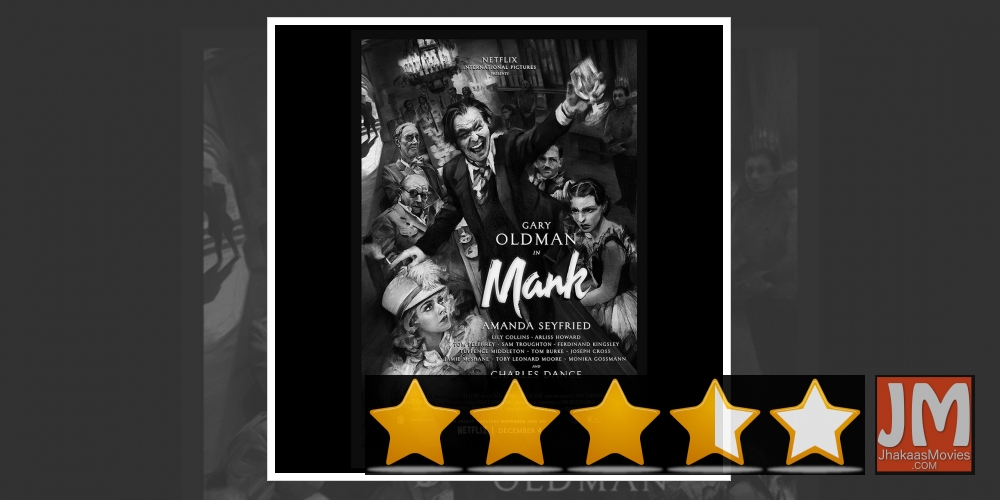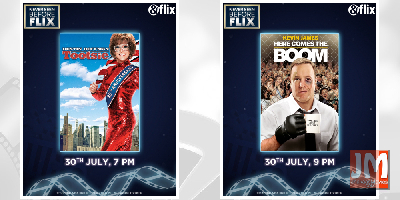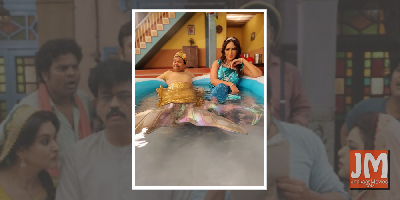 Aan Tiwari honoured with Best Child Actor award for Baal Shiv
Aan Tiwari honoured with Best Child Actor award for Baal Shiv Ghategi rahasymayi ghatnaye!
Ghategi rahasymayi ghatnaye! Amazon Prime Video unveils the 2021 Festive Line-up; brings a heady mix of Indian and International titles on the service
Amazon Prime Video unveils the 2021 Festive Line-up; brings a heady mix of Indian and International titles on the service Release: Music video of, Yeh Haalaath, from Mumbai Diaries 26-11
Release: Music video of, Yeh Haalaath, from Mumbai Diaries 26-11 Bhumi Pednekar feels she shares feel-good value with Akshay Kumar on screen
Bhumi Pednekar feels she shares feel-good value with Akshay Kumar on screen
Review: Mank: Hollywood in black and white, and grey

Mank; Cast: Gary Oldman, Amanda Seyfried, Lily Collins, Arliss Howard, Tom Pelphrey, Tuppence Middleton, Tom Burke, Charles Dance, Monika Gossmann; Direction: David Fincher; Rating: * * * and 1/2 (three and a half stars)
BY VINAYAK CHAKRAVORTY
It is the turn of David Fincher this time, to romance Hollywood in black and white. Hollywood loves this sort of an introspection once in a while, which harks back to its glory days and deconstructing the grime beneath the glamour.
Mank, or Herman J Mankiewicz, was the Oscar-winning co-writer of Orson Welles' Citizen Kane, a film widely acknowledged by many as one of the greatest ever made. Fincher's retro saga primarily rides the struggles of Mank (Gary Oldman, in a performance worthy of Oscar nomination) as he races against deadline to deliver the script of Citizen Kane, even as battles cynicism and alcoholism.
For Fincher, this must be his most unusual film yet. Returning six years after the remarkable Gone Girl, the filmmaker steps off his familiar suspense thriller zone of Se7en, Fight Club, The Game, Panic Room or Gone Girl. He has attempted films drawing from real life before, namely The Social Network and Zodiac, and these films, too, were soaked in his signature dark idiom.
Not that Fincher wholly sets aside the trademark dark edge while narrating the story of Mank, but his new film is more traditional in approach -- almost as a tribute to the era he sets out to capture. The film unfolds at a languid pace, accommodating enough spaces to let the audience fathom the incredible Mank who, in his own words, gets serious about life "only when it's funny".
Essentially, Fincher sets out to document memories, using the life of Mankiewicz as a tragi-comic prop. The film's intent is perhaps best summed up by the brilliant pitch Louis Mayer (played by Arliss Howard), co-founder of Metro-Goldwyn-Mayer, makes while simplifying the business of cinema: "This is the business where the buyer gets nothing for his money but memories."
As Mank struggles to finish his screenplay, the film's 1930s setting allows Fincher to explore an interesting period in history. This was the time of the Great Depression, and the film manages to find an uncanny resonance with the ongoing Covid era, with its mentions of salary rollbacks and its focus on cinema as an industry trying to flourish in the time of the Depression. "When all this is over, picture makers are gonna have to service this new entertainment," business magnate William Randolph Hearst (Charles Dance) tells Mank of the talkies. He almost echoes the sentiment of hope that pervades among pandemic-ridden film folk of today.
Like every film in the past that has ever attempted to lay bare the seamier side of show business, Fincher designs his narrative with old school relish, beyond the black and white cinematography. This is a no-holds-barred portrayal of the heydays of Hollywood, and the film goes beyond authentic set decor and costumes. It is also apparent in the way characters are set up and acted out.
This is a film about Hollywood, but mostly highlighting the industry's behind-the scene players such as studio executives, powerful filmmakers and, of course, writers. They were almost men and they ran the show, dictated terms. Big guns of the era such as Charles McArthur, Ben Hecht, Joe von Sternberg and Irving Thalberg are played out by an impressive cast. Amanda Seyfried brings alive the sensational Marion Davies while Tom Burke gives Orson Welles a good enough rendition. Tuppence Middleton as Mank's wife Sara is a delight to watch.
The film however belongs to Gary Oldman, no surprises. An authorbacked role does justice to Oldman's range as an actor, as he gets going with his portrayal of the titular protagonist. Riding Mank's hallmark sense of humour as well as innate angst, Oldman comes up with one of his greatest starring roles ever, even as Fincher paints Hollywood in black and white, and abundant shades of grey.
Tags: Cinema, Showbiz, Lifestyle, Fashion, Quote Unquote








